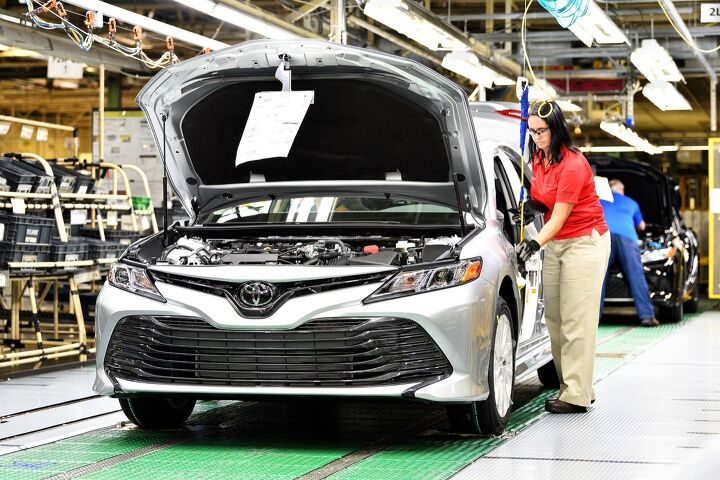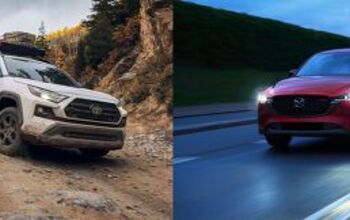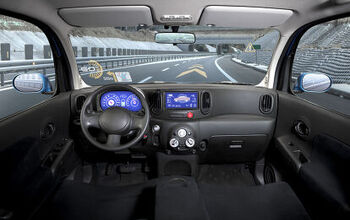Don't Go All Hybrid/Turbo/Electric/Fuel Cell Just Yet - Toyota V6 And V8 to Gain "Dynamic Force" Camry Engine Tech
Forget hybrids. Set aside, for this moment, plug-in hybrids as well. Ignore the EV hubbub and the pie-in-the-sky hydrogen fuel cells. While you’re at it, remove turbochargers and their accompanying displacement reductions from your memory, too.
The naturally aspirated internal combustion engine has legs. The proof is in the 2018 Toyota Camry’s 2.5-liter Dynamic Force four-cylinder. With no hybrid assist, no turbos, no cord that plugs into your garage wall, and no futuristic fuel source, the new Camry 2.5-liter produces 206 horsepower and hits 41 miles per gallon on the highway on regular 87 octane.
That’s 16-percent more power 24-percent more highway mpg than the 2017 Camry’s 2.5-liter four-cylinder. With improvements in conventional, naturally aspirated, gas-fired engines occurring in such leaps and bounds, it’s no wonder Toyota has bigger plans for the Dynamic Force blueprint.
According to Ben Schlimme, Toyota’s executive program manager for powertrains, says “Dynamic Force is not solely aimed at the 2.5-liter engine.” According to Automotive News, Schlimme says the tech featured in the Camry’s 2.5 is destined for other segments, and V6 and V8 editions are now in concept form.
Getting the 2.5 to make substantially more power, without turbocharging and without harming efficiency, involved focusing on good ol’ fashioned fundamentals: friction, air flow, and cooling. Fundamental ideals for engineers, they may be, but enhancing the powerplant required new approaches: “high-speed combustion technology and a variable control system,” Toyota says, with a widened angle between intake and exhaust valves, a laser-cladded valve seat, and “strengthened tumble flow and high performance injector” which improve the fuel/air mixture, among other changes.
Much of the work Toyota did to the 2.5-liter is based on the need to improve the efficiency of its hybrids. “Our electrification pathway relies on these improvements of our internal-combustion engine,” Schlimme says, “hence we put a lot of effort ensuring that this base engine delivers on those principles.”
It doesn’t sound like Toyota is preparing us for a 2025 in which there will be few dealers, a near-100-percent electric fleet, and extensive ride-sharing in autonomous Ubers. You’ll recall Mazda’s belief: internal combustion engines are in the works until at least 2050.
Whether Toyota takes conventional engines that far won’t soon be determined. But if the next iteration of the 2.5-liter Toyota four-cylinder makes similar advances, and if Toyota applies similar improvements to V6 and V8 engines, we won’t be disappointed by missing battery packs and absent turbochargers.
[Images: Toyota]
Timothy Cain is a contributing analyst at The Truth About Cars and Autofocus.ca and the founder and former editor of GoodCarBadCar.net. Follow on Twitter @timcaincars.
More by Timothy Cain
Latest Car Reviews
Read moreLatest Product Reviews
Read moreRecent Comments
- Varezhka I have still yet to see a Malibu on the road that didn't have a rental sticker. So yeah, GM probably lost money on every one they sold but kept it to boost their CAFE numbers.I'm personally happy that I no longer have to dread being "upgraded" to a Maxima or a Malibu anymore. And thankfully Altima is also on its way out.
- Tassos Under incompetent, affirmative action hire Mary Barra, GM has been shooting itself in the foot on a daily basis.Whether the Malibu cancellation has been one of these shootings is NOT obvious at all.GM should be run as a PROFITABLE BUSINESS and NOT as an outfit that satisfies everybody and his mother in law's pet preferences.IF the Malibu was UNPROFITABLE, it SHOULD be canceled.More generally, if its SEGMENT is Unprofitable, and HALF the makers cancel their midsize sedans, not only will it lead to the SURVIVAL OF THE FITTEST ones, but the survivors will obviously be more profitable if the LOSERS were kept being produced and the SMALL PIE of midsize sedans would yield slim pickings for every participant.SO NO, I APPROVE of the demise of the unprofitable Malibu, and hope Nissan does the same to the Altima, Hyundai with the SOnata, Mazda with the Mazda 6, and as many others as it takes to make the REMAINING players, like the Excellent, sporty Accord and the Bulletproof Reliable, cheap to maintain CAMRY, more profitable and affordable.
- GregLocock Car companies can only really sell cars that people who are new car buyers will pay a profitable price for. As it turns out fewer and fewer new car buyers want sedans. Large sedans can be nice to drive, certainly, but the number of new car buyers (the only ones that matter in this discussion) are prepared to sacrifice steering and handling for more obvious things like passenger and cargo space, or even some attempt at off roading. We know US new car buyers don't really care about handling because they fell for FWD in large cars.
- Slavuta Why is everybody sweating? Like sedans? - go buy one. Better - 2. Let CRV/RAV rust on the dealer lot. I have 3 sedans on the driveway. My neighbor - 2. Neighbors on each of our other side - 8 SUVs.
- Theflyersfan With sedans, especially, I wonder how many of those sales are to rental fleets. With the exception of the Civic and Accord, there are still rows of sedans mixed in with the RAV4s at every airport rental lot. I doubt the breakdown in sales is publicly published, so who knows... GM isn't out of the sedan business - Cadillac exists and I can't believe I'm typing this but they are actually decent - and I think they are making a huge mistake, especially if there's an extended oil price hike (cough...Iran...cough) and people want smaller and hybrids. But if one is only tied to the quarterly shareholder reports and not trends and the big picture, bad decisions like this get made.




































Comments
Join the conversation
While I wouldn't want to deprive the TTAC keyboard warriors the delight they attain in demeaning each other, I wonder if anyone has done an actual study comparing similar turbocharged and non-turbocharged engines? I'm old enough to remember when engines needed to be rebuilt at the 80-100,000 mile mark, and automakers struggled to achieve 20mpg in economy cars, with engines that produced double digit horsepower. However you look at it, this is a stunning achievement for Toyota.
"a laser-cladded valve seat"?? Just what the flip is that? Sounds like something taken from the promotional material.